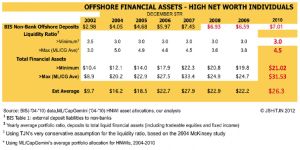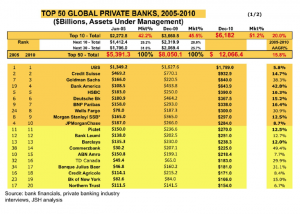Big US Banks Have Gained Market Share in the Looter Assistance Business
 As I noted earlier, the Tax Justice Network just released a study showing that there is somewhere between $21 and 32$ Trillion that tax cheats have hidden in tax havens. Really obscenely rich people like Mitt Romney make up for $9.8 trillion of that–or about 18% of the total liquid net worth in the world, hidden away in tax havens.
As I noted earlier, the Tax Justice Network just released a study showing that there is somewhere between $21 and 32$ Trillion that tax cheats have hidden in tax havens. Really obscenely rich people like Mitt Romney make up for $9.8 trillion of that–or about 18% of the total liquid net worth in the world, hidden away in tax havens.
But there are two other tables from the study that bear notice. The study suggests that the money stashed in tax havens has been growing steadily at a rate of 16% a year.
Our analysis finds that at the end of 2010 the Top 50 private banks alone collectively managed more than $12.1 trillion in cross-‐border invested assets for private clients, including their trusts and foundations. This is up from $5.4 trillion in 2005, representing an average annual growth rate of more than 16%.
 But that’s sort of misleading. As the table above makes clear, the amount in tax havens grew by 67% between 2002 and 2004, then grew by 40% in the following two years, then by another 23% in the last year of the bubble. Then it crashed, basically losing that 23% and plateauing for a year. And then it started growing again, 18% between 2009 and 2010. And who knows how much in the last year?
But that’s sort of misleading. As the table above makes clear, the amount in tax havens grew by 67% between 2002 and 2004, then grew by 40% in the following two years, then by another 23% in the last year of the bubble. Then it crashed, basically losing that 23% and plateauing for a year. And then it started growing again, 18% between 2009 and 2010. And who knows how much in the last year?
The banksters paid a price for 2 years, but the looting has begun again.
What I find particularly interesting–though I’m not sure what to make of it–is the changing share of looter service the big banks are doing. While UBS’ tax shelter dollars continued to grow, they lost market share among tax cheats. Meanwhile Goldman Sachs’ tax shelter dollars almost quadrupled in that time. Bank of America and Wells Fargo made big gains too (though Morgan Stanley’s tax cheat business shrank and JP Morgan’s was somewhat flat.
Like I said, I don’t know what to make of it. But it sure seems like since the crash at least some of the banks have decided to recover by catering to tax cheats.
Lovely. Some of the same banks that are still in business because tax payers bailed them out are increasingly some of the biggest players in facilitating the looting of our own–and every other–country.
Update: This Title was changed.

Some of those certainly increased the amount of money in tax havens by a lot. (Enough to make me think of things like money laundering.) Also, those are the same ones that like to charge customers a lot in fees. They may also be hiding profits overseas to avoid taxes and lots of questions about what they did with the money the government handed them.
Wasn’t UBS the one that had to cough up a lot of names of tax evaders to the IRS. Although I think they balked and didn’t come up with all that was requested or demanded, they came forward with some names. I would imagine that had a lot to do with loss of market share. And of course nothing happened to those criminals except they got to pay the taxes they should have paid for a few of the years they cheated on, plus a measly little 20% penalty. Basically the same thing that happens to you if you forget a 1099 for a bank account when preparing your tax return.
It is just now beginning to be reveled to what extent the Big Bank used the Drug Cartels money to keep themselves and maybe even the USA afloat. With the newer laws allowing the DHS to legally scoop up all the Banking data that goes over the Net I would expect much more.
A while back Hillary Clinton was asked about the failed War on Drugs, and she intimated that too much money was involved to every end it. I believe she meant more ways than one.
@guest: Yup, and I was thinking that myself: the US prosecuted UBS (though note they prosecuted the UBS whistleblower more harshly).
I’m going to play around with the numbers some more on it.
Not surprising, they “run the world.” When you’re friends with Timmy and Hank, and vacation with Bob, Jamie, & Lloyd you are invited into the money vault and get to see how free money is made. Of course you get to borrow all you want at no charge. Any smart “job creator” will use other people’s money to pay bills while loading the “profits” into personal accounts. Evil, not Stupid.
All of this makes me wonder about Grover Norquist…
His pledge has crippled any significant debate about tax policy into the sophomoric rallying cry of “no new taxes” or whatever. How does he feel about tax cheats and their loopholes? What is Grover’s net worth? Where does he keep his piggy bank? Has all of his caterwauling been a huge smokescreen to enable the massive looting evident in the Tax Justice Network report?
The 91,186 richest of the rich– or the “Happy Few” according to the Tax Justice Network’s study –would fill a small city if collected in one spot on the globe.
US cities with about 91,000 people (ranked by population in July 2011)
http://www.census.gov/popest/data/cities/totals/2011/index.html
(I’ve included cities with 92,000 people, in case the Tax Justice Network missed any Happy Few whom have been better than average at hiding their assets):
316. Quincy, Massachusetts 92,909
317. Renton, Washington 92,812
318. Yakima, Washington 92,512
319. Carson City, California 92,376
320. Macon, Georgia 91,856
321. Lee’s Summit, Missouri 91,668
322. Beaverton, Oregon 91,625
323. Tuscaloosa, Alabama 91,605
324. Hesperia, California 91,534
325. Sparks, Nevada 91,195
326. Roswell, Georgia 91,168
327. Federal Way, Washington 91,085
328. Westminster, California 91,064
329. Lynn, Massachusetts 91,040
330. Orem, Utah 90,727
I suppose, instead, they could ALL fit in NYC, or LA, or Chicago and still leave room for others:
Top 3 US cities, ranked by population estimate in July 2011
New York City 8.2 million
Los Angeles 3.8 million
Chicago 2.7 million
Would love to see added columns: number of “Jobs Created” and “Average Salary of workers” in those jobs created. I have a feeling the “Happy Few” may not look so good in those columns if viewed as a percentage of their net worth
@phred: Yes, but to some degree Grover is only one cog in the machine. Then there are groups like the NFIB that astroturf to achieve the same objective.
@pdaly: Thanks for that–a great way to visualize how small a group we’re really talking.
I’m particularly chuffed that Orem, home of BYU, is in the list. Cause it’s such a clubby place to begin with (at least when I lived in UT, the SportsI swimsuit edition came pre-stripped of the good pictures), but also bc it’s really part of a sprawl at this point, in which many people in the sprawl buy into the culture that Orem (and Temple Square) propagates.
@emptywheel: Agreed. I’m just curious to what extent he personally benefits from the looting. Whether he likes it or not, he is the face of tax policy in this country and he richly deserves to go down with the big banks and their wanton criminal conduct (along with their loathsome legal conduct).
Telling the difference between Banking and Business 101 and Pirates of the Caribbean is getting harder by the day.
@pdaly:
Nitpicking: ‘Carson City’ is in Nevada. The one in California is ‘Carson’.
@earlofhuntingdon:
At least ‘Pirates’ is entertaining.
@P J Evans:
good catch. The government census list had the word “city” appended to each name. When I got to Carson, I didn’t think to remove it and capitalized it instead.
It is mind boggling to think a group of ultra rich people occupying a space no larger than the small city of Lynn, MA (near me) could control 30 percent of the global resources–or even 30% of the state’s resources.